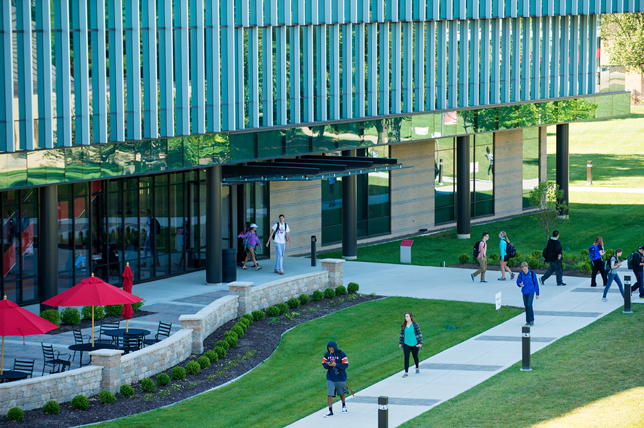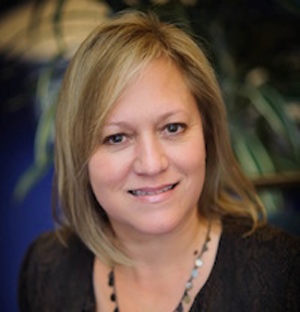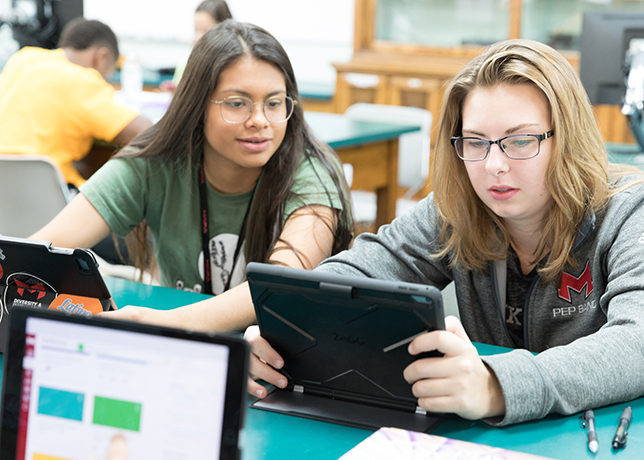Personalizing the Admissions Process to Meet Diverse Student Needs
Maryville University created an "application for anything" tool that allows schools to easily customize admissions applications for specific applicants or programs.
Category: Student Systems & Services
Institution: Maryville University
Project: Enterprise Application Solution for Yield
Project lead: Kathleen Lueckeman, chief innovation officer
Tech lineup: Huron Consulting Group, Salesforce.org

Courtesy of Maryville University
Admissions in higher education is in the midst of a sea change. While most schools have traditionally concentrated on recruiting high school seniors, student demographics have evolved — and the recruitment pools and processes around them have grown more complex. Colleges and universities are dealing with applications for online and residential undergraduate programs, graduate students, executive and continuing education professionals, international students and more.

Lueckeman
Yet despite those diverse needs, admissions offices are often forced to settle for a one-size-fits-all software solution purchased at the organizational level. "Most of the systems have been built for that 80 percent rule of recruiting freshmen — and the rest of us had to live with that and create shadow processes to manage other populations," explained Kathleen Lueckeman, chief innovation officer at Maryville University (MO). "If you have multiple populations all trying to use the same solution, you have to develop workarounds, but who wants to be inefficient?"
To address this issue, Maryville not only designed its own admissions software, but also created what Lueckeman calls an "application builder": a free, open source "application for anything" solution that allows schools to customize applications according to the requirements of a particular applicant or program.
The Enterprise Application Solution for Yield (EASY) was developed on the Salesforce.org platform and uses the Salesforce Community Cloud for its application portal. Lueckeman noted that Salesforce's charitable arm provides 10 free licenses of its Enterprise Edition to all nonprofit higher education institutions, and as part of the company's charitable giving, it also has a grant program called "Force for Change" focused on innovation in education and workforce development.
In fact, in 2016 Maryville won a Force for Change grant to create its admissions software and then allow other schools on the Salesforce platform to install it in their own environments. EASY was released in December 2017. Maryville, which has approximately 6,400 students, is collaborating with the Salesforce.org Higher Education Advisory Council, a community of Salesforce users from higher ed institutions across North America and Europe, to get input and to share the model across organizations.
Developing EASY involved a partnership between the admissions office, the offices for online and graduate programs, the IT department and Lueckeman's Office of Innovation. "We brought in partners from Huron Consulting because our own IT team is still developing the Salesforce skills they need to do something like this," she added. In addition, through its Pro Bono Program, Salesforce.org recruited and managed volunteers who helped with technical assistance.
One of the development challenges was that the Force for Change grant required the program to be finished in one year. "Most software companies take a long time to develop software," Lueckeman noted. "We are not a software company. We had less than a year to develop and release this. That was part of the grant we agreed to, but it was a challenge to get all that done. It really required a commitment from our community."
EASY comes with an Application Control tool that allows users to set up multiple, distinct applications, control basic branding and turn on and off processes for application cancellation and/or withdrawal. A Requirements portion allows permissioned users to create their own questions, document uploads and external requests for information (such as letters of recommendation). An Administration tool allows departments to fulfill requirements that are sent directly to the school, while the Review tool allows readers to rate candidates and make admissions decisions.
EASY also provides various ways to open and close application periods for different populations and programs. When applicants start an application, they answer a few questions to "identify" themselves, allowing the school to narrow down what type of applicant they are. Applicants then see a personalized checklist that is dynamically maintained as questions are answered, references are received and documents are uploaded. Because the checklist makes it clear where their applications stand at any moment, applicants no longer need to contact the admissions office to ask whether materials have been received — cutting down on e-mail and phone calls and giving admissions staffers more time to handle other work.
Lueckeman said staff members were especially pleased when they realized they had the ability to personalize an application to an applicant and customize it to the program. Now they can create requirements that display only to the applicants who need to fulfill them. What's more, requirements can be added after an application decision is made: That is, schools can include forms for housing, event registration and other processes as part of the application software, so that admitted students have one centralized place to complete their onboarding.

Even after a student is admitted, EASY can handle forms for housing, event registration and other processes as part of the application software, so that students have one centralized place to complete their onboarding.
Another appealing aspect of EASY is that departments can control most of the functions without having to heavily rely on IT for updates. "There has always been this natural tension between IT and departments," Lueckeman said. "Our goal is to preserve what is critical for IT to do as an IT function, and to provide user tools to departments that give them the control they need. They are not looking to code on their own. They are looking to change words or add questions, and customize for their needs. The philosophy of building user tools to democratize the implementation was first and foremost in our heads."
With part of the grant funding, Maryville has been holding workshops in 2018 to help schools install and implement EASY. Lueckeman is interested to see new and creative ways other campuses deploy it: At Maryville, another group is using EASY to create a pool of potential adjunct faculty applicants, and in online communities, she gets questions about EASY almost every day. "We have heard of schools looking to use it for study abroad or faculty research applications," she said. In fact, she was recently at a conference and was surprised to see a presentation by Central New Mexico Community College on how they were using the solution. "They did a great job," she said. "I thought that was awesome."
Return to Campus Technology Impact Awards Home